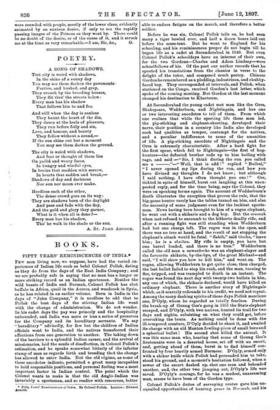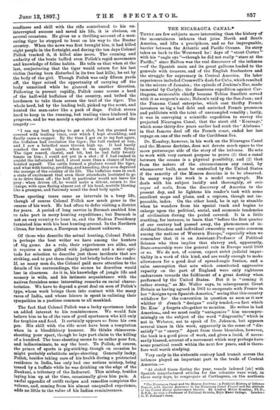BOOKS.
FIFTY YEARS' REMINISCENCES OF INDIA.* FEw men living now, we suppose, have had the varied ex- periences of Indian life such as befel Colonel Pollok, dating as they do from the days of the East India Company ; and we are probably safe in saying that no man has a longer or more striking record as an Indian sportsman. Besides the wild beasts of India and Burmah, Colonel Pollok has shot buffalo in Africa, quail in the Azores, and woodcock in Syria, as he has related in an earlier volume. Born in India in the days of "John Company," it is needless to add that to Pollok the best days of the stirring Indian life went with the change of administration. We do not wonder. In his cadet days the pay was princely and the hospitality unbounded, and India was more or less a series of preserves for the Company and its hereditary servants. We say " hereditary " advisedly, for few but the children of Indian officials went to India, and the natives transferred their affections from one generation to another. The taking down of the barriers to a splendid Indian career, and the arrival of missionaries, laid the seeds of disaffection, in Colonel Pollok's estimation, and he speaks somewhat bitterly of the inferior stamp of man as regards birth and breeding that the change has allowed to enter India. But the old regime, as some of these anecdotes indicate, permitted a great many incapables to hold responsible positions, and personal feeling was a most important factor in Indian controL The point which the Colonel wants to make is that the old Anglo-Indian was invariably a sportsman, and so readier with resources, better
• Fifty Years' Reminiscinces of India. By Colonel Pollok. London : Edward Arnold. able to endure fatigue on the march, and therefore a better. soldier.
Before he was six, Colonel Pollok tells us, he had seen many a tiger bowled over, and half a dozen boars laid out before the mess-tent. But he went to England for hie schooling, and his reminiscences proper do not begin till he- began life as a cadet at Secunderabad in 1849. But even Colonel Pollok's schooldays have an interest of their own, for the two Gordons—Charles and Adam Lindsay—were schoolfellows of his. Of the poet our author records that he- spouted his translations from the classics in verse to the delight of the tutor, and composed much poetry. Chinese Gordon he remembered as a plodding, industrious, and chubby- faced boy. They corresponded at intervals, and Pollok, when stationed on the Congo, received Gordon's last letter, which. spoke of the coming meeting. But Gordon at the last moment changed his destination to Khartoum.
At Secunderabad the young cadet met men like the Orrs, Shakspeare, Wedderburn, and Nightingale, and has one or two interesting anecdotes to tell of them. From which one realises that while the sporting life these men led, the pig-sticking and elephant-shooting, developed their nerve, their position in a country like India also developed' such bad qualities as temper, contempt for the natives, and a peculiar indifference to some of the amenities, of life. A pig-sticking anecdote of Nightingale and the- Orrs is extremely characteristic. After a hard fight for the first spear, which fell to Nightingale—the first of hog- hunters—the defeated brother rode up to him boiling with
rage, and said Sir, I think during the run you called me a —." "Well, that is odd !" replied " "I never opened my lips during the run, and how you have divined my thoughts I do not know; but although I said nothing, I have often thought you one ! " Orr, tickled in spite of himself, burst out laughing at this unex- pected reply, and for the time being, says the Colonel, they were on speaking terms again. The account of Wedderburn's death illustrates the exception that proves the rule, that the. big-game hunter rarely has the tables turned on him, and also the necessity of some judgment even for the luckiest sports- man. News having been brought to him of a rogue elephant, he went out with a shikarie and a dog boy. But the mucnahi when met refused to succumb to the hitherto deadly rifle, and after a running fight was still standing when Wedderburn had but one charge left. The rogue was in the open, and' there was no tree at hand, and the result of not stopping the elephant's attack would be fatal. "Sahib," said Oocha, "leave him; he is a shaitan. My rifle is empty, you have but one barrel loaded, and there is no tree." Wedderbura called the old man a coward—he was an elephant-slayer and the favourite shikarie, by-the-bye, of the great Michael—and. said, "I will show you how to kill him," and went on. The rogue, allowing Wedderburn to get quite close, then charged,. the last bullet failed to stop his rush, and the man, turning to flee, tripped, and was trampled to death in an instant. The rogue was found the next day with twenty-two bullets in him,. any one of which, the shikarie declared, would have killed an ordinary elephant. There is another story of Nightingale which, as it scarcely redounds to his credit, we need not repeat. Amongthe many dashing spirits of those days Pollok mentions one, D'Oyly, whom he regarded as totally fearless. During. the break-up of Goung Gee's gang in 1855 the State elephant escaped, and D'Oyly, with two natives, hunted its trail for two days and nights, subsisting on what they could get, before overtaking the brute. As nothing could be done with the ill-tempered creature, D'Oyly decided to shoot it, and awaited its charge with an old Manton fowling-piece of small bore and a spherical bullet ! His second shot killed the animal. It was this same man who, hearing that some of Gonng Gee's- lieutenants were in a deserted house, set off with an escort, and, getting ahead of them, burst in to find himself con- fronted by four heavily armed Burmese. D'Oyly, armed only with a shikar knife which Pollok had persuaded him to take, stood his ground, and a moment's hesitation followed, when a sowar of the escort dashed up, shot one man and beheaded another, and, the other two jumping out, D'Oyly's life was saved. D'Oyly's courage, for he was a modest, unassuming man, seems to have been of the Gordon type.
Colonel Pollok's duties of surveying routes gave him nn, equalled opportunities of hunting game in But mai), and his
readiness and skill with the rifle contributed to his un- interrupted success and saved his life, it is obvious, on several occasions. He gives us a thrilling account of a man- eating tiger he stopped to hunt on his way to the Bnstar country. When the news was first brought him, it had killed eight people in the fortnight, and during the ten days Colonel Pollok tracked it, it killed nine more. The cunning and audacity of the brute baffled even Pollok's rapid movements and knowledge of feline habits. He tells us that when at the last, conjecturing that the tiger would return for his last victim (having been disturbed in its two last kills), he sat by the body of the girl. Though Pollok was only fifteen yards off, the tiger seized the opportunity of carrying off the body unnoticed while he glanced in another direction.
Following in pursuit rapidly, Pollok came across a herd of the half-wild buffaloes of the country, and bribed the herdsmen to take them across the trail of the tiger. The whole herd, led by the leading bull, picked up the scent, and hunted the man-eater like a pack of dogs. Pollok strove hard to keep in the running, but trailing vines hindered his progress, and he was merely a spectator of the last act of the tragedy :—
"I ran my best hoping to get a shot, but the ground was covered with trailing vines, over which I kept stumbling, and finally came a cropper. By the time I got on to my feet again, the buffaloes had overtaken the tiger ; the bull rushed at him, and I saw a brindled mass thrown high up. It had barely reached the earth again, when it was again sent flying. The tiger roared, clawed, and bit, but he had fully twenty beasts on him ; I could not put in a shot ; if I had rushed in amidst the infuriated herd, I stood more than a chance of being hoisted myself. The cattle formed a phalanx round the tiger, and what with tossing, prodding, and kneading, they soon deprived the scourge of the country of its life. The buffaloes were in such a state of excitement that even their attendants hesitated to go in to drive them off ; the bull in particular would not leave his prey : when driven off, he would make a detour, return to the charge, with eyes flaring almost out of his head, nostrils blowing like a grampus, and furiously assail the dead body again."
These sporting tours came as intervals in a busy life, though of course Colonel Pollok saw much game in the course of his work. He had often to defer visiting a district for years. A period of long service in Burmah enabled him to take part in many hunting expeditions ; but Barmah is not an easy countly to hunt in, and the Madras Presidency furnished him with his best hunting-ground. In the Northern
Circas, for instance, a European was almost unknown.
Of those who describe the actual hunting, Colonel Pollok is perhaps the best writer we have among the hunters of big game. As a rule, their experiences are alike, and it requires a man gifted with judgment and a nice apti- tude for selection to describe just those incidents that are striking, and to put them clearly but briefly before the reader.
If, as many men do, the Colonel paid more attention to the details of his surroundings, the scenes he describes would lose in clearness. As it is, his knowledge of jungle life and scenery is wide, and his intimate acquaintance with the natives furnishes some interesting remarks on racial charac- teristics. We have to depend a great deal on men of Pollok's type, whose work brings them into contact with the many races of India, and whose leisure is spent in enlisting their sympathies in a pastime common to all mankind.
The fact that Colonel Pollok was a lucky sportsman lends an added interest to his reminiscences. We would fain believe him to be of the race of good sportsmen who kill only for trophies and food. It certainly appears so from his own pen. His skill with the rifle must have been a temptation when in a bloodthirsty humour. He thinks rhinoceros- shooting poor sport, though he lays part claim to the killing of a hundred. The bear-shooting seems to us rather poor fun,
and indiscriminate, to say the least. To Pollok, of course, the prince of sports is pig-sticking, though on occasion he
might probably substitute snipe-shooting. Generally lucky, Pollok, besides taking care of his health during a protracted residence in India, has only had one serious mishap, being tossed by a buffalo while he was drinking on the edge of the Dankani, a tributary of the Indravati. This mishap, besides laying him up at the time, occasionally gives him pain. A useful appendix of outfit recipes and remedies completes the 'volume, and, coming from his almost unequalled experience, adds no little to the value of his Indian reminiscences.



































 Previous page
Previous page